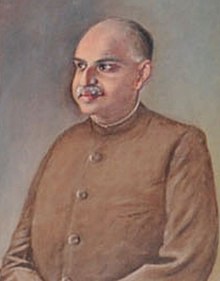Syama Prasad Mukherjee | |
|---|---|
 | |
| Member of Parliament, Lok Sabha | |
| In office 17 April 1952 – 23 June 1953 | |
| Succeeded by | Sadhan Gupta |
| Constituency | Calcutta South East, West Bengal |
| 1st Union Minister of Commerce and Industry | |
| In office 15 August 1947 – 6 April 1950 | |
| Prime Minister | Jawaharlal Nehru |
| Preceded by | position established |
| Succeeded by | Nityanand Kanungo |
| Member of the Indian Constituent Assembly | |
| In office 9 December 1946 – 24 January 1950 | |
| Constituency | West Bengal |
| Founder-President of the Bharatiya Jana Sangh | |
| In office 1951–1952 | |
| Preceded by | position established |
| Succeeded by | Mauli Chandra Sharma |
| Finance Minister of Bengal Province | |
| In office 12 December 1941 – 20 November 1942 | |
| Prime Minister | A. K. Fazlul Haq |
| Member of the Bengal Legislative Council | |
| In office 1929–1947[1] | |
| Constituency | Calcutta University |
| Vice-Chancellor of Calcutta University | |
| In office 8 August 1934 – 8 August 1938[2] | |
| Preceded by | Hassan Suhrawardy |
| Succeeded by | Muhammad Azizul Haque |
| President of Akhil Bhartiya Hindu Mahasabha | |
| In office 1943–1947 | |
| Personal details | |
| Born | 6 July 1901 Calcutta, Bengal Presidency, British India (present-day Kolkata, West Bengal, India) |
| Died | 23 June 1953 (aged 51) Srinagar, Jammu and Kashmir, India |
| Political party | Bharatiya Jana Sangh |
| Other political affiliations | Hindu Mahasabha[3] |
| Spouse |
Sudha Devi
(m. 1922; died 1933) |
| Children | 5 |
| Parent(s) | Ashutosh Mukherjee (father) Jogamaya Devi Mukherjee (mother) |
| Relatives | Chittatosh Mookerjee (nephew) |
| Alma mater | Presidency College (BA, MA, LLB, D.Litt.) Lincoln's Inn |
| Profession | |
| Signature | |
Syama Prasad Mookerjee (6 July 1901 – 23 June 1953) was an Indian barrister, educationist, politician, activist, social worker, and a minister in the state and national governments. Noted for his opposition to Quit India movement within the independence movement in India, he later served as India's first Minister for Industry and Supply (currently known as Minister of Commerce and Industries) in Prime Minister Jawaharlal Nehru's cabinet after breaking up with the Hindu Mahasabha. After falling out with Nehru,[4] protesting against the Liaquat–Nehru Pact, Mukherjee resigned from Nehru's cabinet.[5] With the help of the Rashtriya Swayamsevak Sangh,[6] he founded the Bharatiya Jana Sangh, the predecessor to the Bharatiya Janata Party, in 1951.[7]
He was also the president of Akhil Bharatiya Hindu Mahasabha from 1943 to 1946. He was arrested by the Jammu and Kashmir Police in 1953 when he tried to cross the border of the state. He was provisionally diagnosed of a heart attack and shifted to a hospital but died a day later.[8][9] Since the Bharatiya Janata Party is the successor to the Bharatiya Jana Sangh, Mookerjee is also regarded as the founder of the Bharatiya Janata Party (BJP) by its members.[10]
- ^ Mishra 2004, p. 96.
- ^ "Our Vice-Chancellors". University of Calcutta. Archived from the original on 1 January 2020. Retrieved 1 December 2016.
- ^ "'SP Mukherjee was part of Muslim League govt in Bengal in 1940s': Cong hits back at PM". The Times of India. 7 April 2024.
- ^ Kingshuk Nag (18 November 2015). Netaji: Living Dangerously. AuthorsUpFront | Paranjoy. pp. 53–. ISBN 978-93-84439-70-5.
- ^ "Dr. Shyama Prasad Mookerjee". www.shyamaprasad.org. Archived from the original on 21 July 2022. Retrieved 1 June 2019.
- ^ "What was the Liaquat-Nehru pact, due to which Syama Prasad Mookerjee resigned from the Union cabinet?". The Indian Express. 23 June 2023. Retrieved 24 June 2024.
- ^ "Bharatiya Jana Sangh | Indian political organization". Encyclopædia Britannica. Archived from the original on 20 February 2023. Retrieved 1 June 2019.
- ^ Bakshi 1991, pp. 278–306.
- ^ Smith 2015, p. 87.
- ^ "History of the Party". www.bjp.org. Archived from the original on 12 August 2021. Retrieved 6 August 2019.